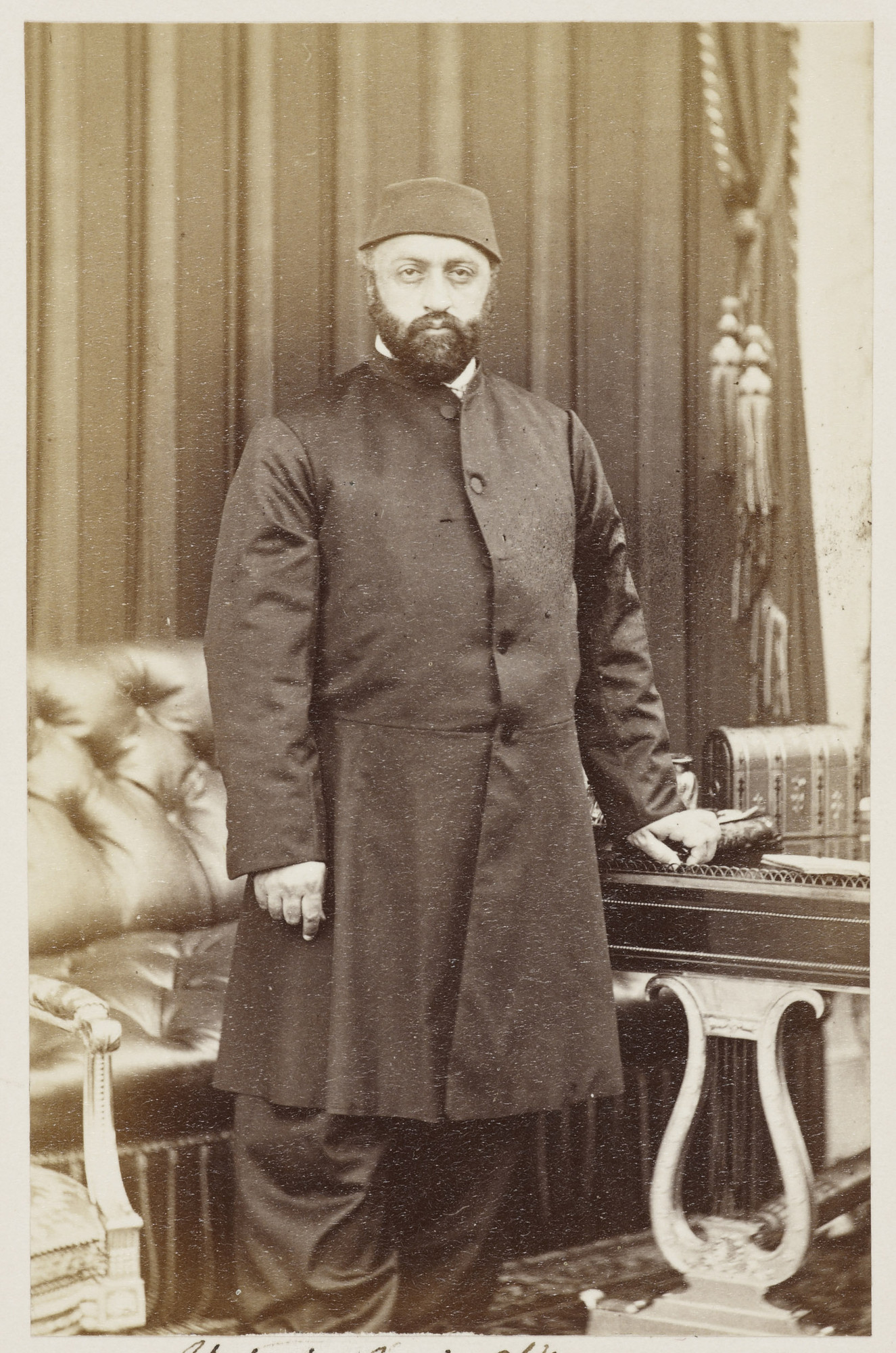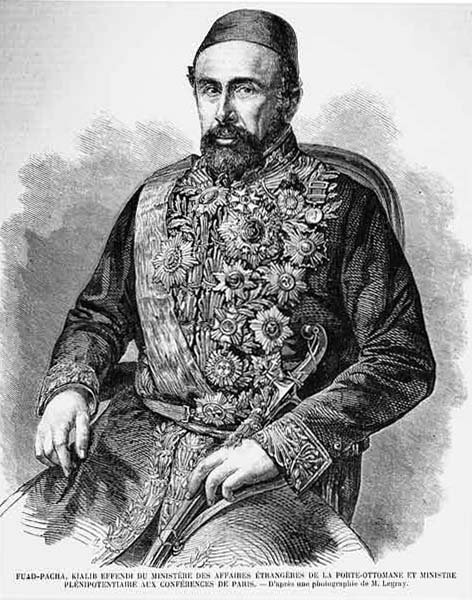|
Władysław Czajkowski
Muzaffer Pasha, born as Ladislas Czaykowski or Władysław Czajkowski (1837/40 – 1907, Beirut, Lebanon, Ottoman Empire), was Governor General ( Mutessarıf) of Mount Lebanon between 1902–1907, a post reserved by international treaty for a Catholic of Ottoman nationality after the civil unrest and international intervention of 1860. He was the son of a Polish count and Polish émigré in the Ottoman Empire, Michał Czajkowski (Sadık Pasha). Czajkowski was educated in Belgium and France, graduating from the School of St Cyr in 1861. After arrival in Istanbul, he was aide-de-camp to the Grand vizier Mehmed Fuad Pasha from 1863 to 1866; then to the Sultan Abdülaziz from 1867 to 1870, during which he accompanied the monarch on his European tour. In 1870 he was appointed to the command of a section of cavalry in the military school, and held that office until the outbreak of the Russo-Turkish War (1877–1878), when he went to the front. He served on the staff, then as colonel of ... [...More Info...] [...Related Items...] OR: [Wikipedia] [Google] [Baidu] |
Abdülaziz
Abdulaziz (; ; 8 February 18304 June 1876) was the sultan of the Ottoman Empire from 25 June 1861 to 30 May 1876, when he was 1876 Ottoman coup d'état, overthrown in a government coup. He was a son of Sultan Mahmud II and succeeded his brother Abdulmejid I in 1861. Abdulaziz's reign began during the Ottoman Empire's resurgence following the Crimean War and two decades of the Tanzimat reforms, though it was still reliant on European capital. The decade after his accession was dominated by the duo of Mehmed Fuad Pasha, Fuad Pasha and Mehmed Emin Âli Pasha, Aali Pasha, who accelerated reorganization of the Empire. The Vilayet Law was promulgated, Western codes were applied to more aspects of Law of the Ottoman Empire, Ottoman law, and the Millet (Ottoman Empire), millets were restructured. The issue of Tanzimat Dualism (politics), dualism continued to plague the empire, however. He was the first Ottoman sultan who traveled to Western Europe in a diplomatic capacity, visiting a n ... [...More Info...] [...Related Items...] OR: [Wikipedia] [Google] [Baidu] |
19th-century Births
The 19th century began on 1 January 1801 (represented by the Roman numerals MDCCCI), and ended on 31 December 1900 (MCM). It was the 9th century of the 2nd millennium. It was characterized by vast social upheaval. Slavery was Abolitionism, abolished in much of Europe and the Americas. The First Industrial Revolution, though it began in the late 18th century, expanded beyond its British homeland for the first time during the 19th century, particularly remaking the economies and societies of the Low Countries, France, the Rhineland, Northern Italy, and the Northeastern United States. A few decades later, the Second Industrial Revolution led to ever more massive urbanization and much higher levels of productivity, profit, and prosperity, a pattern that continued into the 20th century. The Catholic Church, in response to the growing influence and power of modernism, secularism and materialism, formed the First Vatican Council in the late 19th century to deal with such problems an ... [...More Info...] [...Related Items...] OR: [Wikipedia] [Google] [Baidu] |
Polish Emigrants To The Ottoman Empire
Polish may refer to: * Anything from or related to Poland, a country in Europe * Polish language * Polish people, people from Poland or of Polish descent * Polish chicken * Polish brothers (Mark Polish and Michael Polish, born 1970), American twin screenwriters * Kevin Polish, an American Paralympian archer Polish may refer to: * Polishing, the process of creating a smooth and shiny surface by rubbing or chemical action ** French polishing, polishing wood to a high gloss finish * Nail polish * Shoe polish * Polish (screenwriting), improving a script in smaller ways than in a rewrite See also * * * Polishchuk (surname) * Polonaise (other) A polonaise ()) is a stately dance of Polish origin or a piece of music for this dance. Polonaise may also refer to: * Polonaises (Chopin), compositions by Frédéric Chopin ** Polonaise in A-flat major, Op. 53 (, ''Heroic Polonaise''; ) * Polon ... {{Disambiguation, surname Language and nationality disambiguation pages ... [...More Info...] [...Related Items...] OR: [Wikipedia] [Google] [Baidu] |
Vizier
A vizier (; ; ) is a high-ranking political advisor or Minister (government), minister in the Near East. The Abbasids, Abbasid caliphs gave the title ''wazir'' to a minister formerly called ''katib'' (secretary), who was at first merely a helper but afterwards became the representative and successor of the ''dapir'' (official scribe or secretary) of the Sasanian Empire, Sassanian kings. In modern usage, the term has been used for government Minister (government), ministers in much of the Middle East and beyond. Several alternative spellings are used in English, such as ''vizir'', ''wazir'', and ''vezir''. Etymology Vizier may be derived from the Arabic ''wazara'' (), from the Semitic root ''W-Z-R''. The word is mentioned in the Quran, where Aaron is described as the ''wazir'' (helper) of Moses, as well as the word ''wizr'' (burden) which is also derived from the same root. It was later adopted as a title, in the form of ''wazīr āl Muḥammad'' () by the proto-Shi'a leaders ... [...More Info...] [...Related Items...] OR: [Wikipedia] [Google] [Baidu] |
Mushir
() is an Arabic word meaning "counsellor" or "advisor". It is related to the word shura, meaning consultation or "taking counsel". As an official title, it historically indicates a personal advisor to the ruler. In this use it is roughly comparable to the European titles of State Counsellor and Counsellor of State. In a military context, became associated with the idea of the ruler's personal counsellor or advisor on military matters, and as such became the highest rank in Arab countries and the Ottoman Empire. It is used as the highest rank in most armed forces of the Middle East and North Africa, for armies, navies, and air forces. It is therefore equivalent to the ranks of Field Marshal and Admiral of the Fleet. Iraq In Iraq under the rule of Saddam Hussein, the Iraqi Navy maintained a fleet admiral rank known as . A Mushir was the most senior of all naval officers and the rank was rarely bestowed. The sleeve insignia was the same as a British Admiral of the Fleet. ... [...More Info...] [...Related Items...] OR: [Wikipedia] [Google] [Baidu] |
Ottoman Army (1861–1922)
The Ottoman Army was the military of the Ottoman Empire after the country was reorganized along modern western European lines during the Tanzimat modernization period. It operated during the decline and Dissolution of the Ottoman Empire, dissolution of the empire, which roughly occurred between 1861 (though some sources date back to 1842) and 1918, the end of Middle Eastern theatre of World War I, World War I for the Ottomans. The Crimean War was the first war effort in which the modern army took part in, proving itself as a decent force. The last reorganization occurred during the Second Constitutional Era. The uniforms of the modern army reflected the military uniforms of the western European countries who were the Ottoman army's principal advisors at the time. The State organisation of the Ottoman Empire, Ottoman government considered adopting a Western-style headdress for all personnel within the army, but the Fez (hat), fez was favoured as it was more suited to the posture ... [...More Info...] [...Related Items...] OR: [Wikipedia] [Google] [Baidu] |
Russo-Turkish War (1877–1878)
The Russo-Turkish War (1877–1878) was a conflict between the Ottoman Empire and a coalition led by the Russian Empire which included United Principalities of Moldavia and Wallachia, Romania, Principality of Serbia, Serbia, and Principality of Montenegro, Montenegro. Precipitating factors included the Russian goals of recovering territorial losses endured during the Crimean War of 1853–1856, re-establishing itself in the Black Sea and supporting the political movement attempting to free Balkan nations from the Ottoman Empire. The Romanian army had around 114,000 soldiers in the war. In Romania the war is called the Russo-Romanian-Turkish War (1877–1878) or the Romanian War of Independence, Romanian War of Independence (1877–1878). The Russian-led coalition won the war, pushing the Ottomans back all the way to the gates of Constantinople, leading to the intervention of the Western European great powers. As a result, Russia succeeded in claiming provinces in the Caucasus, n ... [...More Info...] [...Related Items...] OR: [Wikipedia] [Google] [Baidu] |
Mehmed Fuad Pasha
Mehmed Fuad Pasha (1814 – February 12, 1869), sometimes known as Keçecizade Mehmed Fuad Pasha and commonly known as Fuad Pasha, was an Ottoman administrator and statesman, who is known for his prominent role in the Tanzimat reforms of the mid-19th-century Ottoman Empire, as well as his leadership during the 1860 Mount Lebanon civil war in Syria. He represented a modern Ottoman era, given his openness to European-style modernization as well as the reforms he helped to enact. Among other posts, he served as Grand Vizier, the equivalent of Prime Minister, on two occasions between 1861 and 1866. He is often regarded, along with Mehmed Emin Âli Pasha, as one of the most influential Ottoman statesmen, who favoured a French-inspired civil code for the newly established civil courts in 1868. Fuad Pasha was a fervent supporter of keeping the empire an absolute monarchy, rejecting the ideas of being legally bounded or restricted by a constitution or legislature. He often clashed w ... [...More Info...] [...Related Items...] OR: [Wikipedia] [Google] [Baidu] |
Mutasarrıf
Mutasarrif, mutesarrif, mutasarriff, or mutesarriff () was the title used in the Ottoman Empire and places like post-Ottoman Iraq for the governor of an administrative district in place of the usual sanjakbey. The Ottoman rank of mutasarrif was established as part of a tanzimat, 1864 reform, and its holder was appointed directly by the Sultan. The administrative district under his authority, the mutasarrifate (), was officially called a () in Turkish or () in Arabic and Persian language, Persian.Meyers (1905–1909)Liwâ A mutasarrif was subordinate to a Wali (administrative title), wali or governor-general of a province, while being of superior rank to a kaymakam.Meyers (1905–1909)Kaimakam Etymology Ottoman Turkish mutasarrıf is derived from the Arabic mutaṣarrif, meaning provincial governor.lexico.commutasarrif Accessed 11 Feb 2022. Mutaṣarrif is the Participle#Arabic, active participle of taṣarrafa, meaning "to act without restriction", "have the right of disposing ... [...More Info...] [...Related Items...] OR: [Wikipedia] [Google] [Baidu] |
Grand Vizier
Grand vizier (; ; ) was the title of the effective head of government of many sovereign states in the Islamic world. It was first held by officials in the later Abbasid Caliphate. It was then held in the Ottoman Empire, the Mughal Empire, the Sokoto Caliphate, the Safavid dynasty, Safavid Empire and Morocco, Cherifian Empire of Morocco. In the Ottoman Empire, the grand vizier held the imperial seal and could convene all other viziers to attend to affairs of the state; the viziers in conference were called "''Kubbealtı'' viziers" in reference to their meeting place, the ''Kubbealtı'' ('under the dome') in Topkapı Palace. His offices were located at the Sublime Porte. Today, the Prime Minister of Pakistan is referred to in Urdu as ''Wazir-e-azam'', which translates literally to grand vizier. Initially, the grand viziers were exclusively of Turk origin in the Ottoman Empire. However, after there were troubles between the Turkish grand vizier Çandarlı Halil Pasha the Younger and S ... [...More Info...] [...Related Items...] OR: [Wikipedia] [Google] [Baidu] |



